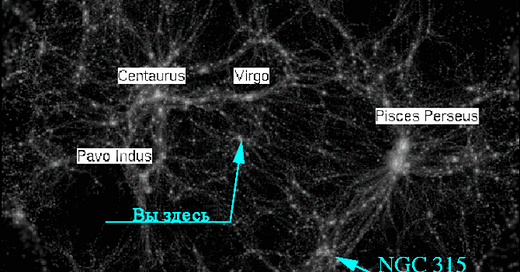My guilty pleasure is the Space Podcast genre on YouTube. One of the topics that gets discussed frequently, almost constantly, is the so-called “Fermi Paradox.” Britannica.com says:
The story goes that in 1950 Enrico Fermi and his colleagues were discussing the existence of alien life over lunch. The question that Fermi asked the table became infamous in its simplicity: “Where is everybody?” The room fell silent because, well, nobody had an answer. Originally, the question was meant to attack the idea of interstellar travel, the possibility of which Fermi wasn’t confident in. But the question remains: if there were civilizations scattered across the stars by the billions, why haven’t we heard from them?
That’s the “Fermi Paradox.” It’s not a formal paradox; it’s simply a confounding mystery to astronomers. There are many different answers to this paradox, none of which science commentators find satisfactory. There is one answer that is rarely put forward, which is the idea that Earth may be alone, truly alone in the Universe, to the point where this lecture that deals with some of the common assertions could be considered mildly controversial:
The null hypothesis (that we are alone) is an anathema to Science because it brings with it uncomfortable implications, which is why there is so much cope in Science seeking to come to any answer but this. These implications are metaphysical in nature: physicists assert that there is no privileged point of reference in the Universe; astronomers assert that, at a broad cosmic level, every place in the Universe is the same. These astronomers maintain that the Universe is “homogeneous and isotropic,” which is just to say that it is the same in every place, in all directions. But what if it’s not? What if this particular place (Earth) is extraordinarily different in a way that defies all rationalizations as to why?
The mathematics of probability seem to insist (but perhaps not, as the above lecture addresses) that it shouldn’t be possible. It’s a compelling logic. Humans cannot comprehend the size of outer space, although we can comprehend relative solar distances in terms of time: minutes to orbit, days to the Moon, months to Mars, ten years to Pluto, and decades to escape the vast cloud of ice and rock orbiting the Sun an extreme distances. Maybe you can even comprehend an entire galaxy, or the local group; but the “filaments” that seem to make up the structure of the Universe, strings of galaxies that go on for billions and billions of light-years into parts of the Universe we cannot even see, defy all comprehension. The sheer magnitude of such a vast, lifeless emptiness is terrifying.
And yet, all signs point to exactly this: that the Universe is both incomprehensibly large and incomprehensibly devoid of all life, save for us Earthlings. It’s impossible not to conjure God in one’s mind when pondering this, which is why the answer to the Fermi Paradox is not normally considered.
The fear of God leads scientists on a desperate crusade to hunt for microscopic fossils of bacteria on Mars in a vain attempt to find a local solution to their cosmic problem; or they try to create artificial life of their own, chimeras of silicon and bacteria. Even fears of an A.I. “superintelligence” apocalypse are somewhat of a comfort, because at least it shows that life can destroy itself as an explanation as to why no other life is visible in the universe. The spiritually weakened human is frightened at the prospect that he might bear sole responsibility for consciousness and morality in the universe, and he is desperate to be liberated from this responsibility by pawning it off on some robot, or at least through annihilation.
In contrast to the neutered, quivering, craven ejecta of rovers sent from Earth to Mars, and other sterile spacecraft to elsewhere, meekly spouting from the planet as if in terror of the black maw of outer space, lies the dormant Faustian drive to the infinite: if the Cosmos was created for Man to inhabit, then no distance or void of all-encompassing nothingness can inspire the slightest trepidation in a spaceman, because it is all his to conquer.





I love reading and thinking of ideas like this. I was quite the amateur astronomer as a young adult and teen because of my fascination of this subject.
I started attending churches a couple months ago and the idea of god or a god is something I can’t wrap my head around. I enjoy thinking of ideas like we’re some kind of computer simulation, or that we have been visited before and maybe have had knowledge passed on to us from other beings (imagine all we’ve lost in the library of Alexandria, technology and building methods we couldn’t even replicate with modern tech).
It’s really crazy. We’re not here for even a blink of an eye - let a group alone humans who can pass along accrued knowledge long enough to come to an understanding of all that exists.
Loads of interesting things to think and contemplate on.
This was a great overview of the matter and there's nestled in there the embryo of a neupolitik: The Spaceman's Burden